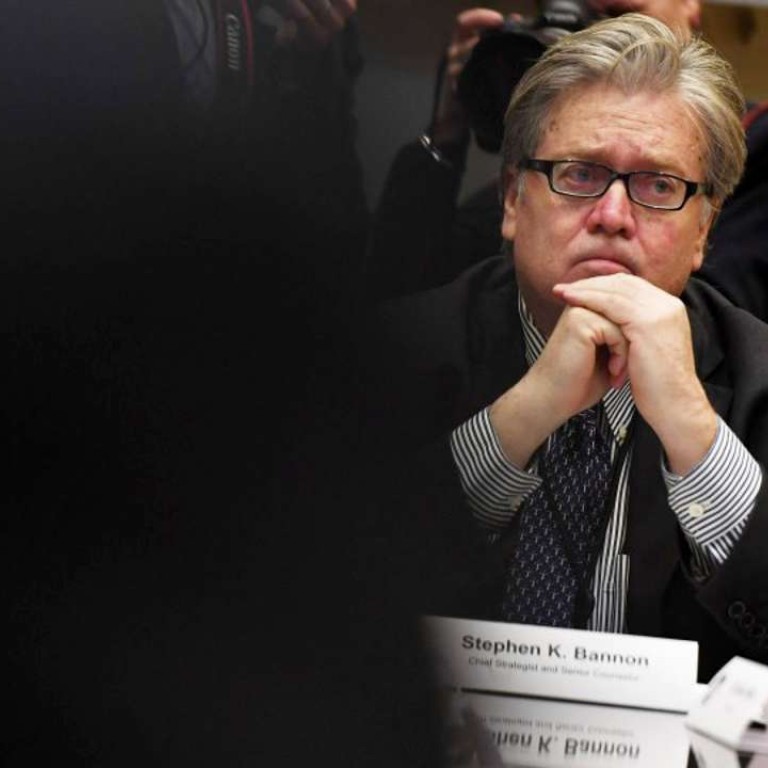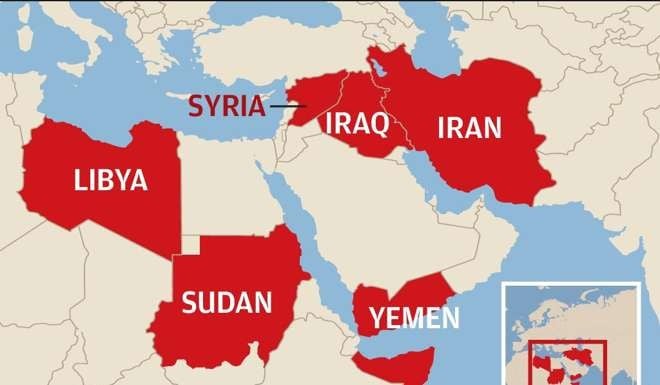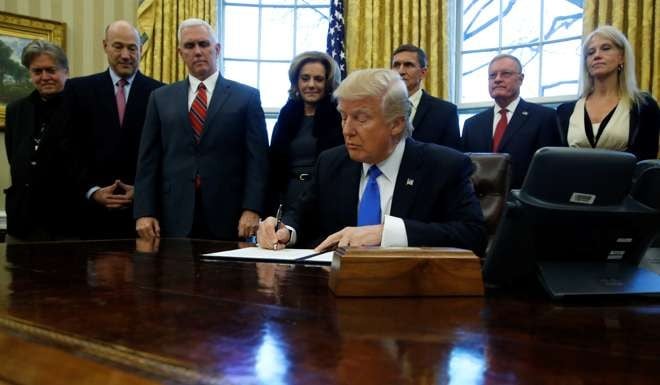
White House aides who wrote Trump’s travel ban see it as just the start
Even as confusion, internal dissent and widespread condemnation greeted President Donald Trump’s travel ban and crackdown on refugees this weekend, senior White House aides say they are only getting started.
Trump and his aides justified Friday’s executive order, which blocked travel from seven majority-Muslim countries for 90 days and halted refugees from around the world for 120, on security grounds — an issue that they say they take seriously. But their ultimate goal is far broader.
Trump’s top advisers on immigration, including chief strategist Steve Bannon and senior adviser Stephen Miller, see themselves as launching a radical experiment to fundamentally transform how the US decides who is allowed into the country and to block a generation of people who, in their view, won’t assimilate into American society.
That project may live or die in the next three months, as the Trump administration reviews whether and how to expand the visa ban and alter vetting procedures. White House aides are considering new, onerous security checks that could effectively limit travel into the US by people from majority-Muslim countries to a trickle.
Watch: Trump’s travel ban sparks outrage across the United States
The administration faced down another torrent of criticism Monday — from fellow Republicans on Capitol Hill, career diplomats, national security experts and world leaders — over the hasty rollout of the order, as well as the message it sent to both friends and adversaries in the war on terrorism. Though Trump’s ban does not affect all Muslims, as he promised during the campaign, many see it as religiously targeted.
The government bureaucracy also began a swift and startling level of resistance to the new president’s initiative, punctuated by a letter from acting US Attorney General Sally Yates, who declared that she would refuse to defend the order in court against a series of lawsuits.

A group of US diplomats circulated an internal memo through a State Department process that allows them to privately express dissent, arguing that Trump’s order “runs counter to core American values of non-discrimination, fair play and extending a warm welcome to foreign visitors and immigrants.
“A policy which closes our doors to over 200 million legitimate travellers in the hopes of preventing a small number of travellers who intend to harm Americans … will not achieve its aim of making our country safer,” said a draft version of the memo.
The Pentagon, with written support from Republican military veterans serving in Congress, began compiling a list of Iraqi citizens who have worked with the armed forces and is recommending that they be exempt from Trump’s temporary ban on entry to the US by people from Iraq and six other predominantly Muslim countries: Iran, Syria, Sudan, Somalia, Libya and Yemen. The move could potentially shield tens of thousands of Iraqi interpreters, advisers, and others who have assisted the US military from the president’s controversial action.

The list will include names of individuals who have “demonstrated their commitment” to helping the US, Captain Jeff Davis, a Pentagon spokesman, said.
“Even people that are doing seemingly benign things in support of us — whether as a linguist, a driver, anything else — they often do that at great personal risk,” he said. “So people who take these risks are really making a tangible signal of support to the United States, and that’s something that will, and should be, recognised.”
White House spokesman Sean Spicer said the administration recognises the help of Iraqi interpreters and others who have served this country, but added that they would remain subject to intense vetting.
“We should make sure that in those cases they’re helped out,” he said.
“But that doesn’t mean that we just give them a pass.”
Despite the backlash, senior White House officials maintain that the ban is popular with Trump’s voters, though no reputable polling on the question has been released since Friday’s order. Spicer said media coverage of the implementation had been overblown, given that only 109 of 325,000 travellers were detained in the first 24 hours. He said Trump is putting in place proactive security measures rather than reacting to attacks.

“I’m sorry that some folks may have had to wait a little while, but I think the president would much rather know that he’s not placing a call to someone who was killed because someone was let into this country to commit a terrorist act,” he said.
Still, the countries of origin for perpetrators of several prominent attacks cited by Spicer were not on the list of banned countries. Spicer and other administration officials said more countries could be added.
Spicer had little sympathy for dissenting diplomats, saying their disagreement with the policy calls “into question whether or not they should continue in that post or not.”
Yet they were hardly the only ones voicing concern. Phone lines throughout the Capitol were jammed with constituents asking questions and raising concerns over the order.

White House aides fought back against characterisations that they had kept the order to themselves, pointing to input they had gotten for months from allies.
Senior GOP staff on the House and Senate judiciary committees helped write a version of the executive order on their own time during Trump’s transition.
They based its legal wording on the harsh immigration policy Trump laid out on the campaign trail. During a speech in Phoenix in August, Trump promised to suspend immigration from “places like Syria and Libya” and create an “ideological certification to make sure that those we are admitting to our country share our values and love our people.”
But several stakeholders said they were left out.
One Republican senator who contacted the White House on Sunday seeking guidance failed to get full clarification, according to an aide.

Two GOP aides complained that Michael McCaul, a Texas Republican who chairs the Homeland Security committee, had “absolutely no role” in drafting Trump’s final order. They said that a memo McCaul drafted with former New York Mayor Rudolph Giuliani, a longtime Trump supporter, and others focused largely on explaining “why the Muslim ban was a terrible idea.”
The aides disputed that Trump’s order amounted to a Muslim ban, noting that Indonesia, which has the largest Muslim population in the world, was not on it.
“It’s self-evident that the coordination of this executive order was bungled, that has had consequences, and we hope that in the future the White House will more proactively engage Congress and the agencies that are affected,” said one of Republican leadership aides, granted anonymity to discuss internal deliberations.
The chief architects of Trump’s order, Bannon, Miller and national security adviser Michael Flynn, forged strong bonds during the presidential campaign.

The trio, who make up part of Trump’s inner circle, have a dark view of refugee and immigration flows from majority-Muslim countries, believing that if large numbers of Muslims are allowed to enter the US, parts of American cities will begin to replicate disaffected and disenfranchised immigrant neighbourhoods in France, Germany and Belgium that have been home to perpetrators of terrorist attacks in Europe in recent years.
Within decades, Americans would have “the kind of large and permanent domestic terror threat that becomes multidimensional and multigenerational and becomes sort of a permanent feature,” one senior administration official argued.
“We don’t want a situation where, 20 to 30 years from now, it’s just like a given thing that on a fairly regular basis there is domestic terror strikes, stores are shut up or that airports have explosive devices planted, or people are mowed down in the street by cars and automobiles and things of that nature,” the official said.
Counterterrorism experts have long noted that Muslim immigrants in the US are better assimilated and less likely to be radicalised than immigrants in many European cities.
But the connection between immigration, security, economics and culture that defines the nationalist ideology of Bannon and Miller has become intertwined in Trump’s own rhetoric.
“Our country needs strong borders and extreme vetting, NOW,” Trump tweeted over the weekend. “Look what is happening all over Europe and, indeed, the world — a horrible mess!”

